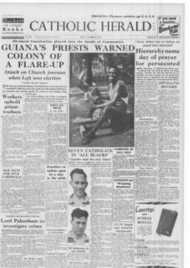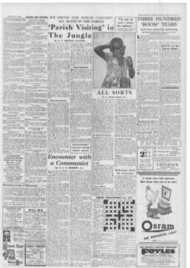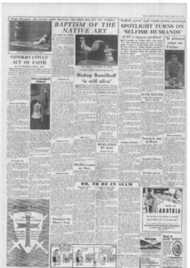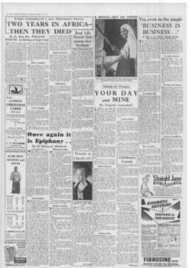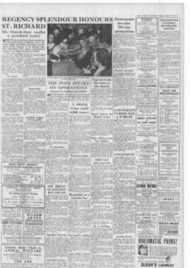Page 4, 16th October 1953
Page 4

Report an error
Noticed an error on this page?If you've noticed an error in this article please click here to report it.
Tags
Share
Related articles
All Sorts
Nativity Scene In The Shops And Factories
A Wonderful Revival
11
Tiiiiiiiiitill1111111111111111111111111111111111111111111...
All Sorts: By Fr. Bernard Basset, S. J.
In a Few Words
The Crib at Harrods T AM sure that my London readers 1 will be sorry to hear that it is at present unlikely that there will be a window displayed crib at Harrods this Christmas. Perhaps this is due to the fact that Mr. Edward W. Lawrence Grieve is no longer connected with window display there. He tells me that he has received hundreds of letters front unknown passers-by who have admired the crib in past years and been helped by it, His experience suggests that the display of cribs in shop windows could be greatly extended if a campaign were started to support the idea. One point he makes is that though the display need not be at all expensive, it should he entirely segregated from the display of merchandise. At least the crib should be screened off. Travel agencies also, he thinks, could usefully vary with cribs their rather monotonous display.
Moving the right way AVER Y full house indeed was present at the Cenacle Convent in Hampstead on Sunday for the Brains Trust which closed a weekend Study Conference on Moral Problems, The moral problems studied and discussed were in •he main those which would naturally arise when the lecturers and brainstrusters were distinguished medical men together with Fr. R y l a n d Whitaker, a Jesuit who has been a practising doctor. One of the things that impressed me was the great frankness and the sincerity with which delicate questions were tackled. We have moved a long way when a convent can be the venue for this type of conference and discussion, and we have surely moved in the right direction. The only possible effect of avoiding such problems or skating over them is ignorant and ill-informed consciences even among people whose training and interests should make them natural leaders, both within the Catholic world and, not less im portant, outside it. All the more reason to be grateful to Mother Thornton, the Superior, for adding yet another venture to the many undertakings which makes her convent so important a part of Catholic life in London. She has the art, among other gifts, of persuading busy men, like Mr. J. V. O'Sullivan, the emigrant gynecologist, and Dr. Elkisch, to give of their time. Mr. O'Sullivan, I may say, missed half his lunch on Sunday to attend a confinement and be back for the Brains Trust.
A wore to Catholic Societies THE evident success of the Brains Trust itself confirms my belief that this now well-worn institution will find its Catholic future in discussing definite set problems rather than anything and everything. A not inconsiderable experience of them makes it clear that the same old questions are apt to recur again and again, even if the words are occasionally new. And now that similar discussions are so common on the radio and TV, the average Catholic one may well sound rather tame in comparison. But if a definite subject is set, say Education or the Liturgy or the Church and War, or moral problems listed under any one or two of the Commandments, or relations with non-Catholics—the list is endless—then the Brains Trust, while not losing its entertaining quality, becomes a genuine form of Catholic education. Those present can carry to others the valuable information they have so easily obtained. Nor do I see any reason why some of the questions should not be set by the chairman or other members of the Trust to ensure a backbone of serious work, Chairman's job ITHINK most of the speakers who lase called upon with some regularity to speak at Catholic meetings would prefer to be members of a brains trust because this involves little or no preparation. Thus a "star" or two can be easily found, and other members can be recruited locally from the clergy and professional men and women who will certainly have valuable contributions to make in their own subjects. A great deal depends on the chairman. On his judgment depends the whole nature of the proceedings, He must be able to rouse general interest and get the audience together. He must have a firm control both of his speakers and the audience. He must have a definite plan, best discussed previously with the speakers. He must choose the questions so that serious discussion is interspersed with lighter items. There is no reason why a few more irrelevant and lighter questions should not be treated even when the meeting is for the discussion of a set question. .He must have a light touch throughout. He himself must enjoy his job and communicate his enjoyment to all present. If a meal cannot be afforded to get the chairman and speakers together, then the silver collection will surely run to a drink. This may make a lot of difference.
The Duke of Bedford y HAVE more than an impersonal I regret at the tragic death of the Duke of Bedford. At one time, at any rate, he was a strong supporter of this paper, and often wrote in it. He admired it for its refusal to support policies of hatred, the use of any means in war time and unconditional surrender. In personal relations he was charming to deal with, and one was always impressed by the contrast of his aristocratic features and voice with his stubborn defence of unpopular and ultra-radical views. While he was so right on some points, I think he suffered from an inability to relate the various campaigns he ran with the fundamentally true maxim that politics is the art of the possible. He would have achieved much more had he remembered this. R.I.P.
From Exeter to Rome THE extremely handsome cover of the Exeter Catholic Magazine makes a very effective appetiser to its contents. Dozens of magazines come my way, and whether one studies them or not so often depends on the first impression they make. This production having thus been opened reveals the buoyant activities of the Catholics of Exeter and district, and sandwiches these among interesting and particularly wellprinted articles. I have no need to be introduced to my old friend, the Beda Review, which 1 rate at the very top of its class, In this issue there is a most interesting article called "A South African Conversion" in which the writer, Charles Runge. gives a most useful summary of the Christian position in South Africa, especially with reference to Anglicanism. The author formerly belonged to the Mirfield Community, and was at school (Chartcrhouse) with Mgr. Vernon Johnson. He joined the Beda last October.
Wanted: a bookbinder AN extremely worthy Catholic undertaking which brings help and consolation to people in distress for whom others can hardly cope has asked me to find out whether an inexpensive bookbinder is to be found. The request came a good many weeks ago but unfortunately eluded my memory, and I have only just come across a note of it. I know that bookbinding is a fairly common hobby, so if any dompetent bookhinder is prepared to help in this appeal, 1 will he happy to put him or her in touch with the enquirer.
JOTTER
blog comments powered by Disqus


